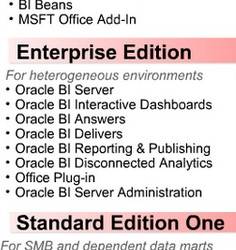About
When you move from one 11g release to another, you do not use the Oracle Fusion Middleware Upgrade Assistant. Instead, you use various other tools including the Patch Set Assistant.
Whereas upgrading from 10g to 11g is referred to as an “out-of-place upgrade”, moving from one 11g release to another 11g release is referred to as “in-place” because you apply the new software to your existing files.
Articles Related
System Requirements and Certification
The Oracle Fusion Middleware Supported System Configurations page gives you access to the System Requirements and Supported Platforms for Oracle Business Intelligence Suite Enterprise Edition 11gR1 (11.1.1.9.0)
Oracle WebLogic Server
Oracle WebLogic Server must have the version 10.3.6.0.0
$ cd $FMW_HOME\wlserver_10.3
$ cat .product.properties | grep WLS_PRODUCT_VERSION
WLS_PRODUCT_VERSION=10.3.6.0
Database
12.1.0.1+; 11.2.0.1+; 11.1.0.7+; 10.2.0.4+;
Example:
BANNER
--------------------------------------------------------------------------------
Oracle Database 11g Enterprise Edition Release 11.2.0.3.0 - 64bit Production
PL/SQL Release 11.2.0.3.0 - Production
CORE 11.2.0.3.0 Production
TNS for IBM/AIX RISC System/6000: Version 11.2.0.3.0 - Production
NLSRTL Version 11.2.0.3.0 - Production
Exalytics
You can upgrade to OBIEE 11.1.1.9.0 on Exalytics PS4 and PS5 by following steps in the Fusion Middleware Upgrade Guide for Oracle Business Intelligence, Moving from 11.1.1.3, 11.1.1.5, 11.1.1.6, or 11.1.1.7 to 11.1.1.9.
[root@amsovs001 exalytics_ovm_scripts]# imageinfo
Exalytics 2.0.1.3.0 (build:r)
Image version : 2.0.1.3.0
Image build version :
Creation timestamp : 2012-08-09 11:47:59 -0400
Kernel version : 2.6.32.21-45.6xen
Image activated : 2014-01-15 11:10:18 -0500
Image status : SUCCESS
[root@amsovs001 exalytics_ovm_scripts]# ddcli
Pre
Microsoft Active Directory
When using Microsoft Active Directory as the Identity Store and also using the virtualize=true option, you will be unable to log in to OBIEE. This relates to unpublished bug 20188679 - authentication fails against 3rd party ldap when virtualize=true set. You should download patch 20188679 for this issue on their installation platform before continuing to upgrade to 11.1.1.9.0.
Download
Ensure to download the OBIEE release from the Oracle Software Delivery Cloud for production environments and not from Oracle Technology Network (OTN).
Verify the CPU architecture:
$uname -p
x86_64
Steps
See:
Post
Skin
Usage Tracking
usage tracking gets more columns.
Add the following column in the S_NQ_ACCT physical table in the repository:
- ECID: The system-generated execution context ID.
- HASH_ID
- SERVICE_NAME: The name of the service.
- SESSION_ID: The ID of the session
- TENANT_ID: The name of the tenant of the user who ran the query
start_ts and end_ts column have now a timestamp data type.
- Change it in the S_NQ_ACCT physical table in the repository
- and also in the database
alter table s_nq_acct modify start_ts timestamp(6);
alter table s_nq_acct modify end_ts timestamp(6);
Usage tracking tracks now the init block
- Add the table S_NQ_INITBLOCK in the repository
- Modify the NQSConfig.ini configuration file
INIT_BLOCK_TABLE_NAME = "Database"."Catalog"."Schema"."S_NQ_INITBLOCK";
INIT_BLOCK_CONNECTION_POOL = "Database"."Connection Pool";
Restart BI Server (OBIS), start a analytics and check that the logging tables are populated:
- s_nq_acct
select
user_name,
start_ts,
end_ts,
tenant_id,
ecid,
service_name,
session_id,
hash_id
from
s_nq_acct
where
end_ts > sysdate - 1
order by
end_ts desc;
- s_nq_initblock
select * from s_nq_initblock where start_ts > sysdate -1;
